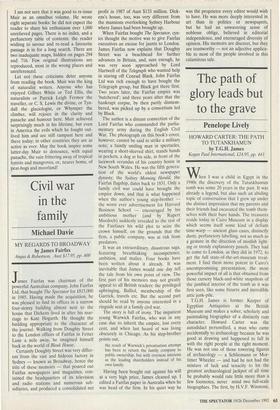Civil war in the family
Michael Davie
MY REGARDS TO BROADWAY by James Fairfax
Angus & Robertson, Aust $17.95, pp .400
James Fairfax was chairman of the powerful Australian company, John Fairfax Ltd, that bought The Spectator for £815,000 in 1985. Having made the acquisition, he was pleased to find its offices in a narrow four-storey building almost next to the house that Dickens lived in after his mar- riage to Kate Hogarth. He thought the building appropriate to the character of the journal. Walking from Doughty Street to the London offices of Fairfax in Fetter Lane a mile away, he imagined himself back in the world of Bleak House.
Certainly Doughty Street was very differ- ent from the vast and hideous factory in Sydney — known as Broadway, hence the title of these memoirs — that poured out Fairfax newspapers and magazines, con- tained the headquarters of its television and radio stations and numerous sub- sidiaries, and produced a consolidated net profit in 1987 of Aust $133 million. Dick- ens's house, too, was very different from the mansions overlooking Sydney Harbour where James had been brought up.
When Fairfax bought The Spectator, cyn- ics thought the motive was to give Fairfax executives an excuse for jaunts to London. James Fairfax now explains that Doughty Street was a beachhead for further advances in Britain, and, sure enough, he was very soon approached by Lord Hartwell of the Telegraph who wanted help in staving off Conrad Black. John Fairfax Ltd was rich enough to have bought the Telegraph group, but Black got there first. Two years later, the Fairfax empire was 'butchered'; and three years after that the bankrupt corpse, by then partly dismem- bered, was picked up by a consortium led by Black.
The author is a distant connection of the Lord Fairfax who commanded the parlia- mentary army during the English Civil War. The photograph on this book's cover, however, cannot be said to strike a military note; a faintly smiling man in spectacles, wearing a short-sleeved shirt, stands hands in pockets, a dog at his side, in front of the lacework verandas of his country house in New South Wales. He was the fifth genera- tion of the world's oldest newspaper dynasty; the Sydney Morning Herald, the Fairfax flagship, dates back to 1831. Only a family civil war could have brought the empire down, and that is what happened when the author's young step-brother — the worst ever advertisement for Harvard Business School — encouraged by his ambitious mother (and by Rupert Murdoch) suddenly revealed to the rest of the Fairfaxes his wild plot to seize the crown himself, on the grounds that the firm, a public company, was at risk from predators.
It was an extraordinary, disastrous saga, featuring breathtaking incompetence, ambition, and malice. Four books have been written about it already. It was inevitable that James would one day tell the tale from his own point of view. The first part of his memoirs may not greatly appeal to all British readers: the privileged upbringing, Balliol, membership of the Garrick, travels etc. But the second part should be read by anyone interested in a ringside seat at a family civil war.
The story is full of irony. The impatient young Warwick Fairfax, who was in any case due to inherit the empire, lost every cent, and when last heard of was living obscurely in Chicago. As his step-brother points out,
the result of Warwick's privatisation attempt has been to return the family company to public ownership, but with overseas interests as the leading shareholders instead of his own family.
Having been bought out against his will at a very high price, James cleaned up. I edited a Fairfax paper in Australia when he was head of the firm. In his quiet way he
was the proprietor every editor would wish to have. He was more deeply interested in art than in politics or newspapers, but he had an unwavering sense of noblesse oblige, believed in editorial independence, and encouraged diversity of opinion. His memoirs are discreet, but they are trustworthy — not an adjective applica- ble to most of the people involved in this calamitous tale.










































































































 Previous page
Previous page